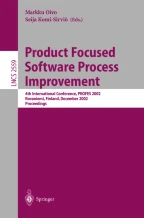Abstract
Process improvement studies have tended to focus on software process improvement (SPI) framework such as the generic “best practices” models (e.g., CMM and SPICE), SPI Models (e.g., PDCA and IDEAL), and Quality Improvement Paradigm (QIP). However, there are still difficulties due to the resistance within the organization and the tendency to return to the previous state. In this study, we point out it is the transition part that is overlooked in the SPI Model and explain how we apply transition management to software process improvement in the Software Center, Samsung Electronics Co. Ltd. The study also shows that considering transition management during SPI planning leads to more accurate estimation for time and goal achievement of SPI work.
Access this chapter
Tax calculation will be finalised at checkout
Purchases are for personal use only
Preview
Unable to display preview. Download preview PDF.
Similar content being viewed by others
References
Humphrey, W.S., Managing the Software Process, Addison-Wesley, 1990.
Paulk, M. C. et al, The Capability Maturity Model: Guidelines for Improving the Software Process, Addison-Wesley, 1995.
ISO/IEC 15504 TR2, Software Process Assessment and Capability Determination, ISO/IEC, 1998.
Grady, R. B., Successful Software Process Improvement, Hewlett-Packard Company, 1997.
McFeeley, B., IDEALSM: A User’s Guide for Software Process Improvement, CMU/SEI-96-HB-001, Feb. 1996.
Bridges, W., Managing Transitions, Addison-Wesley, 1991.
Thomas, M., McGarry F., “Top-down vs. Bottom-up Process Improvement,” IEEE Software, pp.12–13, July 1994.
Basili, V. et al, “SEL’s Software Process improvement program,” IEEE Software, pp.83–87, Nov. 1995.
Stelzer, D., and Mellis, W., “Success Factors of Organizational Change in Software Process Improvement,” Software Process Improvement and Practice, pp.227–250, 1998.
Rifkin, S., “Why Software Process Innovations Are Not Adopted,” IEEE Software, July/Aug. 2001.
Bach, J., “Enough about Process: What We Need Are Heroes,” IEEE Software, Mar. 1995.
Wiegers, K. E., “Why is Software Improvement So Hard?,” Software Development, Feb. 1999.
Myers, W., “Why software developers refuse to improve”, Computer, pp.110–112, Apr. 1998.
O'Day, D., “This old house [software development]”, IEEE Software, pp. 72–75, Mar./Apr. 1998.
Pfleeger, S. L., “Realities and Rewards of Software Process Improvement”, IEEE Software, pp.99–101, Nov. 1996
Jakobsen, A. B., “Bottom-up Process Improvement Tricks”, IEEE Software, Jan./Feb. 1998.
Joon Sung Hong, Kang Sun Lee, ASP(A Software Process) for improving software process, APSEC, 1999.
Appleton, B., “Patterns for Conducting Process Improvement”, Proceedings of the 4th Annual Conference on PLoP, 1997.
Rico, D. F., “Software Process Improvement(Impacting the Bottom Line by using Powerful “Solutions”)”, http://david frico.com/spipaper.pdf, Dec. 1998.
Hunter, R.B., Thayer, R.H. (eds.), Software Process Improvement, IEEE Computer Society Press, 2001.
Author information
Authors and Affiliations
Editor information
Editors and Affiliations
Rights and permissions
Copyright information
© 2002 Springer-Verlag Berlin Heidelberg
About this paper
Cite this paper
Lee, Sa., Choi, B. (2002). Transition Management of Software Process Improvement. In: Oivo, M., Komi-Sirviö, S. (eds) Product Focused Software Process Improvement. PROFES 2002. Lecture Notes in Computer Science, vol 2559. Springer, Berlin, Heidelberg. https://doi.org/10.1007/3-540-36209-6_5
Download citation
DOI: https://doi.org/10.1007/3-540-36209-6_5
Published:
Publisher Name: Springer, Berlin, Heidelberg
Print ISBN: 978-3-540-00234-5
Online ISBN: 978-3-540-36209-8
eBook Packages: Springer Book Archive
